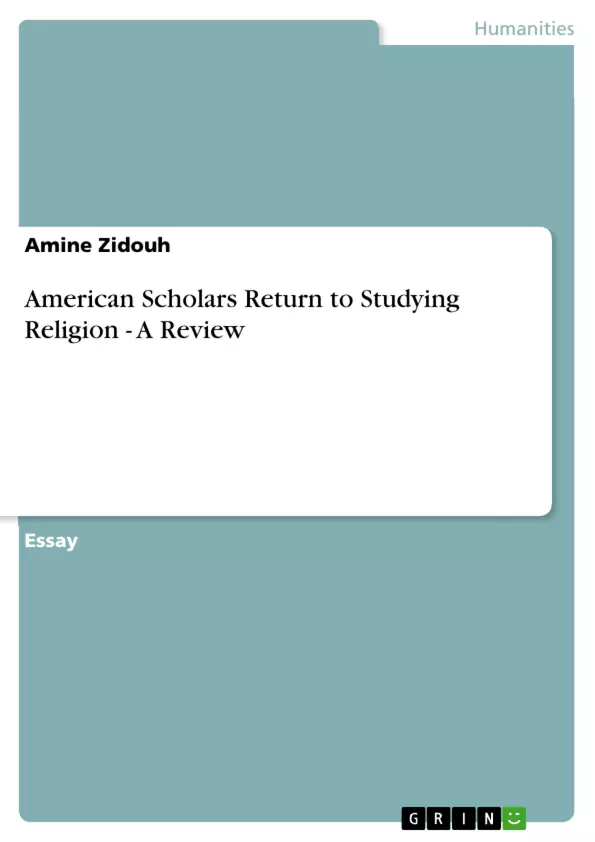Jürgen Habermas, talking about John Rawls, once said “[that the latter] did posterity a great service in thinking at an early date about the political role of religion.” (2008:20). Today, the same can be, and in many ways surely is, said about religion in academia, or to paraphrase Habermas about the political role of religion in the academic sphere. It was once believed, that the university is a very, if not the most, secularized space in American society. This idée recue is now challenged by many scholars, and according to Schmalzbauer and Mahoney (2008: 1) “a new story needs to be told about religion in the academy”.
Table of Contents
- Scholars Return to Studying Religion
- Secularization and the Return of Religion
- Two Perspectives on Religious Studies
- Blurring of Departmental Limits
- Limitations and Obstacles
Objectives and Key Themes
This article explores the resurgence of religious studies in academia. It examines the reasons behind this renewed interest and analyzes the different perspectives scholars bring to the study of religion. The article also highlights the challenges and opportunities associated with this revival.- The changing landscape of secularization in academia
- The emergence of new approaches to studying religion
- The role of interdisciplinarity and multidisciplinarity in religious studies
- The challenges and opportunities facing religious studies in academia
Chapter Summaries
The article begins by discussing the historical context of religion's declining influence in academia, tracing the process of secularization back to the 20th century. It argues that the rise of specialization and the emphasis on objective, verifiable knowledge contributed to this decline.The article then explores two distinct perspectives on religious studies: one focused on analyzing religion as an objective object of study and the other incorporating personal religious convictions into research. The authors critique the first perspective as being "idealistic" and argue for the ethical and realistic value of the second approach.
The article also highlights the blurring of departmental boundaries in contemporary academia as a contributing factor to the revival of religious studies. It points to the increasing inclusion of religion-related courses in fields like medicine and social work, illustrating how interdisciplinarity has fostered a more inclusive approach to religious studies.
Finally, the article acknowledges the challenges and obstacles facing the religious resurgence in academia. Despite a growing recognition of religion's significance in contemporary society, the authors note that there is still a lack of attention given to religion within academic discourse. They advocate for greater engagement with religious topics in academic circles.
Keywords
This article focuses on the themes of secularization, religious studies, interdisciplinarity, objectivity, and the role of religion in contemporary society. It examines the evolving landscape of academic scholarship concerning religion and argues for the importance of incorporating diverse perspectives and perspectives that incorporate personal religious convictions into research. The article highlights the significance of interdisciplinarity in bridging disciplinary gaps and fostering a more holistic understanding of religion in various academic fields.Frequently Asked Questions
Why is there a resurgence of religious studies in American academia?
The idea that the university is a purely secularized space is being challenged as scholars recognize the ongoing political and social significance of religion in society.
How has the perspective on secularization in universities changed?
While it was once believed that specialization would eliminate religion from the academy, a "new story" is being told that acknowledges religion's place in academic discourse.
What are the two main perspectives on studying religion?
One perspective treats religion as an objective, verifiable object of study, while the other incorporates personal religious convictions into the research process.
How does interdisciplinarity affect religious studies?
Departmental limits are blurring, with religion-related courses increasingly appearing in fields like medicine, social work, and the social sciences.
What are the obstacles to studying religion in academia today?
Despite the resurgence, challenges remain regarding the lack of attention given to religious topics in broader academic circles and the struggle for objective vs. subjective methodologies.
- Quote paper
- Student-Researcher Amine Zidouh (Author), 2013, American Scholars Return to Studying Religion - A Review, Munich, GRIN Verlag, https://www.grin.com/document/212049



